| AWARDS | |
| Home Research Group Publications Awards Contact |
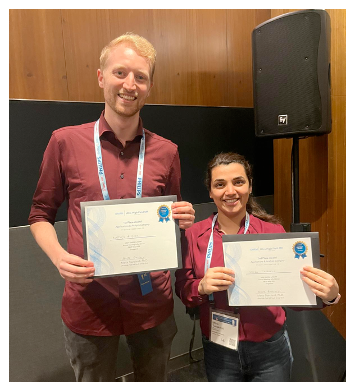 At the 2024 ISMRM in Singapore, Thijs de Buck received 1st prize at the High Field Study Group poster competition in the application category for presenting “7 Tesla MRI In Routine Surgical Planning For Deep Brain Stimulation For Parkinson’s Disease".
Mitra Tavakkoli received 2nd prize at the High Field Study Group poster competition, also in the application category, for her abstract on "Advancing Free-Breathing Liver MRI At 7T With Pseudo-Spiral Cartesian Sampling And Phase-Shimming", which was the output of her ISMRM Research Exchange Grant from last year.
In 2024, Wietske was invited to join the Annual Meeting Program Committee of the ISMRM and the editorial board of the new journal Imaging Neuroscience.
At the 2024 ISMRM in Singapore, Thijs de Buck received 1st prize at the High Field Study Group poster competition in the application category for presenting “7 Tesla MRI In Routine Surgical Planning For Deep Brain Stimulation For Parkinson’s Disease".
Mitra Tavakkoli received 2nd prize at the High Field Study Group poster competition, also in the application category, for her abstract on "Advancing Free-Breathing Liver MRI At 7T With Pseudo-Spiral Cartesian Sampling And Phase-Shimming", which was the output of her ISMRM Research Exchange Grant from last year.
In 2024, Wietske was invited to join the Annual Meeting Program Committee of the ISMRM and the editorial board of the new journal Imaging Neuroscience.
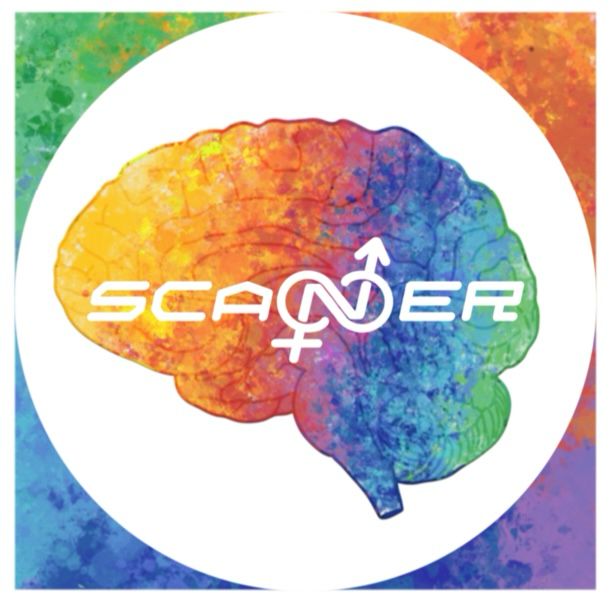 Our Nationale Wetenschapsagenda consortium project SCANNER, led by Alexandra Badura, started.
Our Nationale Wetenschapsagenda consortium project SCANNER, led by Alexandra Badura, started.Myrte, Wietske and Menno Schoonheim received a research grant from the Stichting MS Research: De rol van de kleine hersenen in MS. We also received a grant from the Friends Foundation of the Netherlands Institute for Neuroscience (Stichting Vrienden van het Herseninstituut), made possible by Stichting Auxilium Mar Mar to buy an MR-compatible wheelchair to facilitate MR session participation by less mobile people. In 2023, our Radiology paper "High-Resolution Motion-corrected 7.0-T MRI to Derive Morphologic Measures from the Human Cerebellum in Vivo" was highlighted with an editorial. Wietske joined the editorial board of the journal Brain Topography. 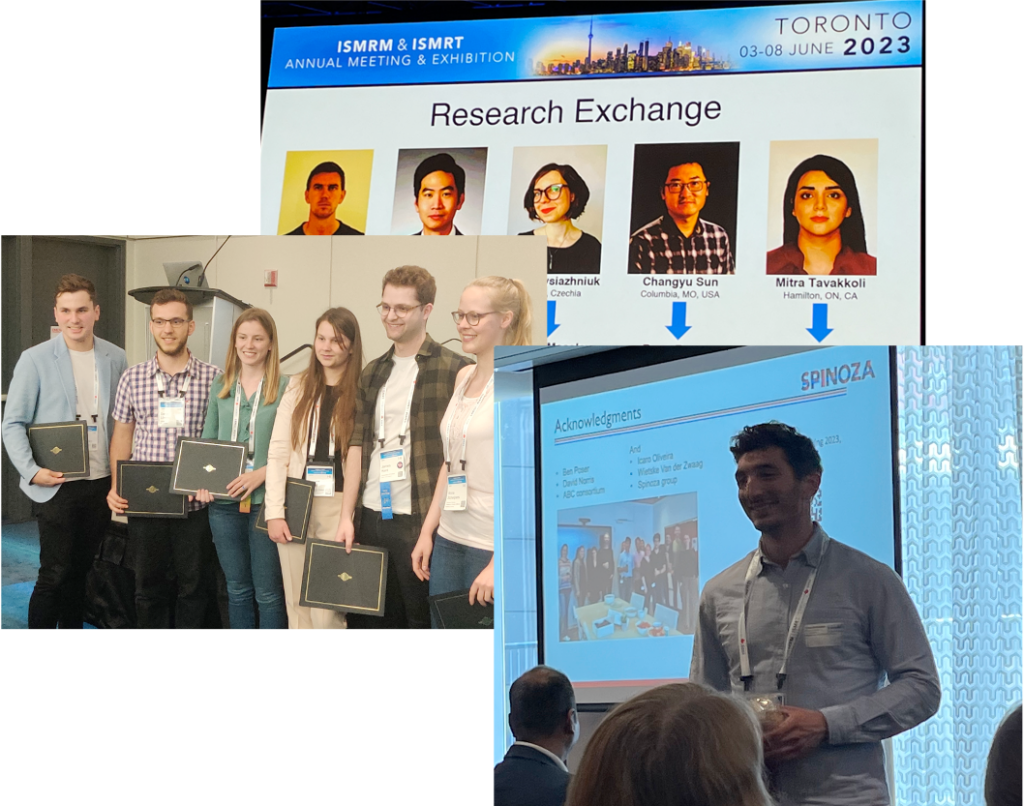 At the ISMRM Annual Meeting in Toronto, no fewer than 3 group members received awards:
Mitra Tavakkoli won the ISMRM Research Exchange Grant , which she will use to visit the Spinoza Centre and the Amsterdam UMC to work on ‘Recurrent Inference Machine in the application of 3T hyperpolarized 129Xe ventilation MRI and 7T liver proton MRI‘.
At the ISMRM Annual Meeting in Toronto, no fewer than 3 group members received awards:
Mitra Tavakkoli won the ISMRM Research Exchange Grant , which she will use to visit the Spinoza Centre and the Amsterdam UMC to work on ‘Recurrent Inference Machine in the application of 3T hyperpolarized 129Xe ventilation MRI and 7T liver proton MRI‘.Emma Brouwer received a poster award for her abstract on ‘Proprioceptive engagement in the human cerebellum using 7T-fMRI‘ at the Ultra-High Field Study Group business meeting. Nikos Priovoulos received the Philips Brain Connectivity Award for his work on ‘Isolating the arterial blood volume change to probe fMRI spatial specificity‘.
In 2020, I was elected board member of the ISMRM study group Current Issues in Brain Function. Board members are elected for a 4 year period, including time as secretary, vice-chair and chair. The study group organising (Virtual) meetings and advocates brain function initiatives within ISMRM. In 2019, I received an NWO Vidi grant for the project "New dimensions in human cerebellar MRI". This grant allowed me to form my own group at the Spinoza Centre. In 2018, the Spinoza Centre was awarded a KNAW research grant to fund the linescanning project. We established and improved linescanning in humans, and aim to use this in neuroscientific experiments. With Matthan Caan as first author, we won the Philips Brain Connectivity Award for the 2018 ISMRM abstract "MP2RAGEME: T1, T2* and QSM mapping in one sequence at 7 Tesla." In 2017, the Spinoza Centre received an NWO Aspasia grant. The postdoc working on this grant uses high-resolution functional MRI to investigate cerebellar function. My cerebellar research line started with a Swiss National Science Foundation project grant for “Cerebellar somatotopy with ultra-high field fMRI” in 2014. |
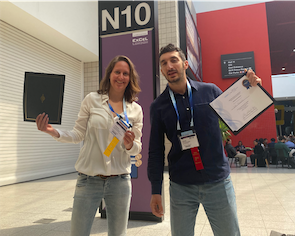 In 2022, we returned to live conferences with a flourish.
At the
In 2022, we returned to live conferences with a flourish.
At the 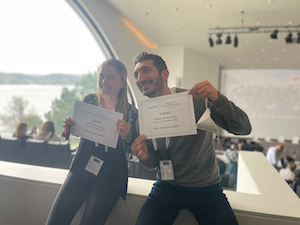 Two prizes for cerebellar presentations were won at the
Two prizes for cerebellar presentations were won at the